
Megumi Shima
Nihon Keizai Shimbun Inc.
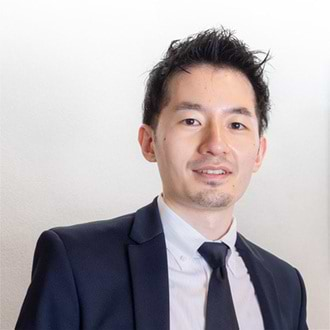
Togo Fujii
Dentsu Inc.

Jiro Murayama
Dentsu Inc.
The Future Creative Center (FCC), Dentsu's creative cross-disciplinary organization, is a group of more than 70 people who provide creative support in the area of future creation beyond the boundaries of advertising. In this series of articles, the Center members discuss their future initiatives under the theme of “Future x Creativity.”
For a long time, the world has used economic growth as an indicator of affluence, a prime example of which is GDP (gross domestic product). However, some feel that affluence may not be measured exclusively by material things.
In this context, a consortium of companies was established in 2021 to create a world in which people's well-being is valued in addition to their material wealth. Dubbed the "Well-being Initiative," it consists of the Well-being for Planet Earth Foundation, Nikkei Inc. and 19 companies in Japan (as of the publication of this article). Dentsu is supporting the planning and production of the initiative.
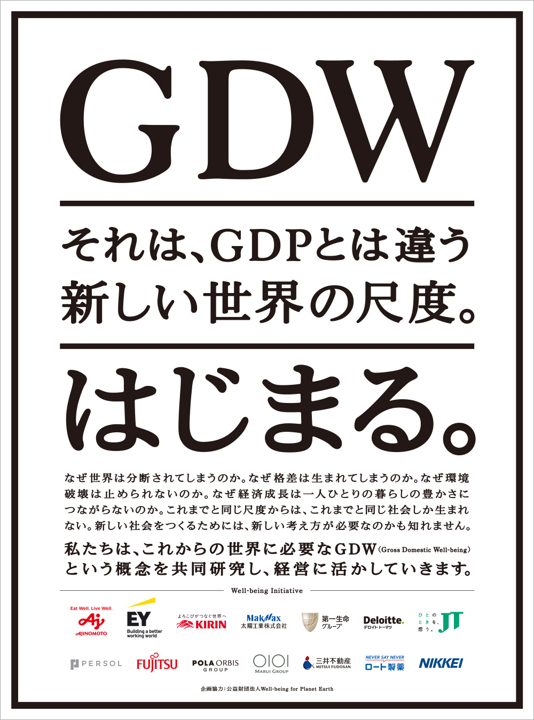
The Initiative aims to promote the evaluation of well-being in corporate management. It is developing Integrated Financial Statements as a tool to replace conventional financial statements that focus on business performance.
To this end, Ms. Megumi Shima of the Media Business Advertising and Communications Unit of Nikkei Inc., Mr. Togo Fujii of the Dentsu Newspaper Bureau, and Mr. Jiro Murayama of Dentsu zero, a member of the Dentsu FCC, discussed the initiative's objectives, activities, and the development of the Integrated Financial Statements.

| * | This interview was conducted online. |
|---|
Companies work together to come up with new indicators of affluence using a different scale than GDP
Fujii: The Well-being Initiative is a consortium of companies working to put the concept of well-being and its new evaluation indicators on the social agenda in the coming era.
The SDGs, which many companies are currently working on, are set for the year 2030. The long-term vision is to make the post-2030 global agenda about subjective well-being under the “post-SDGs.” To achieve this vision, we are planning to create GDW (Gross Domestic Well-being) as a new indicator alongside GDP.
However, the concept of well-being is not yet firmly established, and discussions need to take place on how to measure the indicator. Perhaps it would be more accurate to think of this initiative as a community in which participating companies share various topics on well-being, think together, and put them into practice.
Shima: Since the end of World War II, GDP has been used as an important indicator of economic growth, but we believe there must be wealth that cannot be measured by GDP alone. The COVID-19 pandemic made us realize this, and I feel that more and more companies are now turning their attention to well-being.
Japan, in particular, is ranked 54th in the March 2022 World Happiness Ranking published by a UN-affiliated organization, despite the fact its GDP is the third largest in the world. What lies behind Japan's lack of happiness despite its supposed economic affluence? In this sense, I think it is necessary for Japan to take well-being seriously. I also feel it is necessary to create GDW as an indicator that is separate from and on par with GDP, and to think about this together with representatives of various companies. For these reasons, Nikkei is also involved in this initiative.
Fujii: This initiative was launched when Yoshiki Ishikawa of the Well-being for Planet Earth Foundation asked us for advice on how to create a global agenda for the post-SDGs era from Japan.
Only Nikkei Inc. can handle such a theme that involves industry, government, and academia. We asked them to join us, and in March 2021, the project was inaugurated. We now have 19 companies participating in the program.
Shima: The reason we have had so many companies interested is that they are already thinking about what must be done after 2030, beyond the SDGs. This was a necessary perspective for corporate management in the post-SDGs era.
Also, as Mr. Fujii mentioned, well-being is a concept that has not yet been solidified. Many companies participated because they felt the significance of working together to create something new, rather than passively participating in something that has already been decided.
2021 is the first year of "Well-being" for Japan
Fujii: This initiative aims not only to spread the concept of well-being throughout the world, but also to create a society in which many companies take the initiative to make the world a better place, and where their activities are properly evaluated.
However, since this is a challenge that no one has taken on before, we have actually been moving forward step by step with the participating companies, Mr. Yoshiki Ishikawa, and the members of Nikkei Inc.
We have conducted four major activities so far while brainstorming: The first is a roundtable where executives from participating companies gather to discuss how to promote well-being in society and how companies can incorporate it.
Murayama: I helped design some of the roundtable meetings, and the important point was the topic of discussion. I didn’t want the roundtable to simply be a place for each company to present its activities, but also a place for everyone to discuss what makes a good company from the perspective of well-being. As a result, the chairperson and vice chairperson facilitated the discussion, and it became a forum where various opinions were exchanged on major themes such as "What is a good society?”
Fujii: The second activity that this initiative has been about the workshops that companies participate in. This will be explained in more detail later. The third activity is holding symposiums where experts gather.
The fourth is media dissemination to promote well-being. We have been using the media, mainly the Nikkei Group, to create educational advertisements and feature programs.

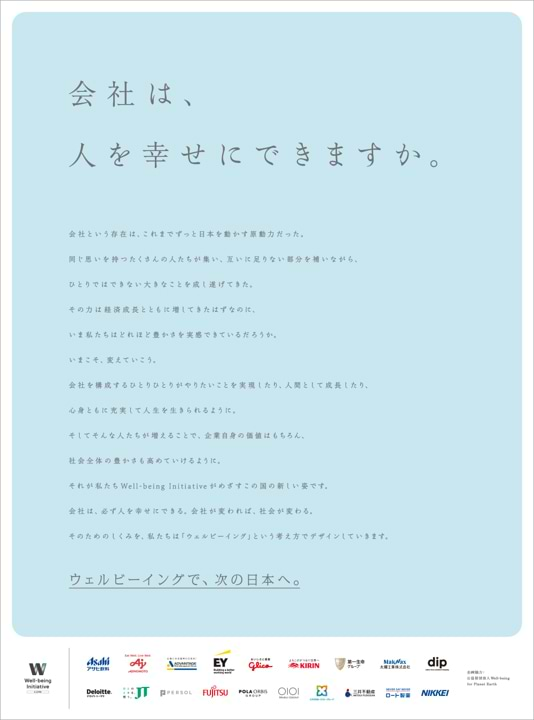
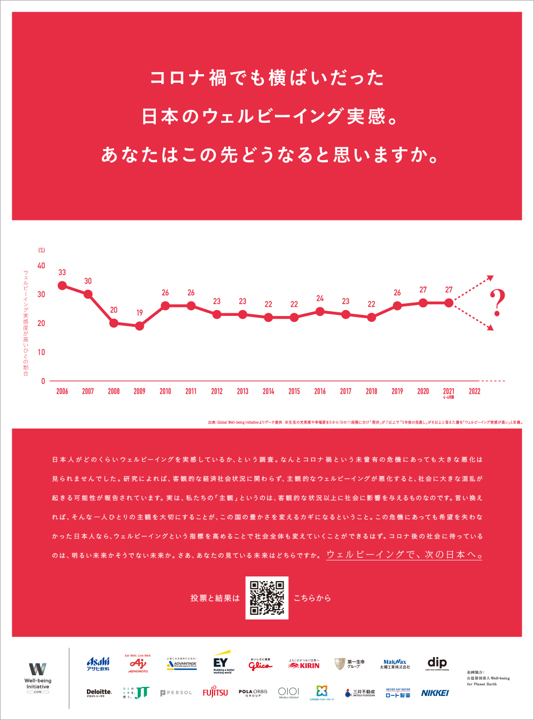
Shima: Not many people understand the concept of well-being yet, so it is important to increase the number of opportunities for people to come into contact with it. First, we will pitch the idea to the public through advertising projects, and as it gradually spreads, there will be more opportunities for it to be featured in editorial articles.
So far, we have been sowing the seeds, and I feel that the amount of editorial coverage has increased, with the term "well-being" starting to naturally come up in conversations with executives during interviews.
Fujii: One of the major achievements last year was that the Japanese government also took action. We had proposed the idea to the government even before the initiative was established, and in February 2021, Hirofumi Shimomura, then LDP policy chief, said in the Diet, "We should advocate a new GDW alongside GDP." All the team members were impressed (laughs).
Since then, Well-being has been mentioned in the "Basic Policy on Economic and Fiscal Management and Reform 2021" and in various other policies, and I believe that 2021 is the first year of Well-being for Japan.
What are "Integrated Statements" that reveal not only financials but also invisible corporate value?
Murayama: Changing the definition of a “good company” will be important for the initiative in the future. Until now, corporate value has been measured primarily in terms of performance, but non-financial information and intangible assets such as the condition of employees (employees), environmental initiatives (environment), and contributions to society (society) are also important.
The financial statements used to measure corporate value today were created about 70 years ago and have not been updated since. They provide information on a company's performance and financial aspects, but the problem of how other contributions should be disclosed and evaluated remains.
To address this issue, we have developed the Integrated Statements, a one-picture model that shows a company's value and status with respect to non-financial information such as Well-being and ESG that also functions as a planning tool for incorporating Well-being into business management.
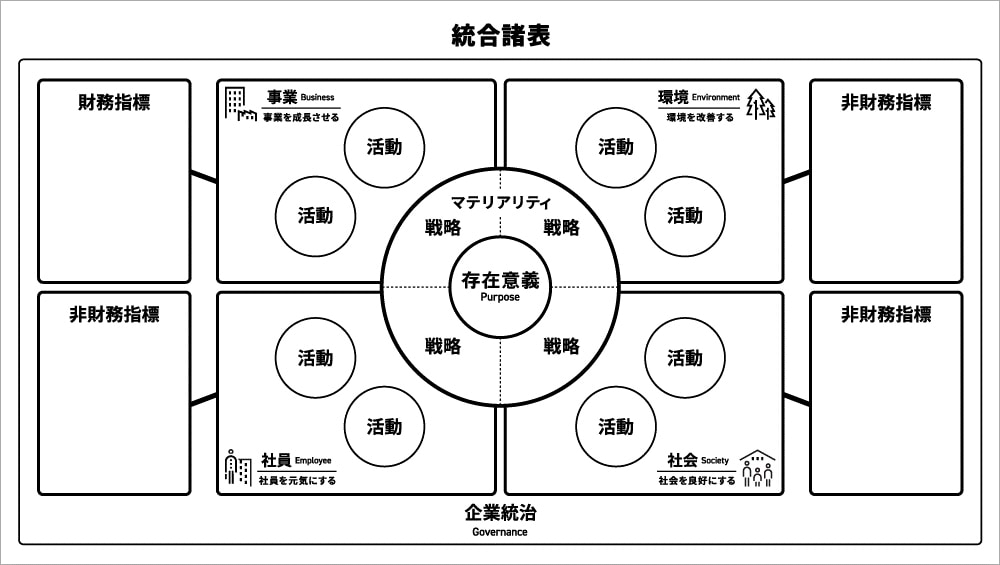
In corporate management, it is important to integrate not only the business, but also the four quadrants of employees, the environment, and society. To this end, it is necessary to first clarify the company's raison d'etre (purpose) and then consider each area (quadrant) around it.
Integrated Statements visualize the company's specific actions in addition to materiality (strategy) in the four quadrants of business, employees, environment, and society, while placing the purpose in the center. By placing KPIs such as non-financial indicators beyond these four quadrants, a single picture of the company's current state can be created, showing how the company thinks and what it is doing.
I hope that having each company share this kind of work will lead to the incorporation of well-being into corporate management.
Fujii: We also held a workshop using the Integrated Statements mainly for the companies participating in the initiative. It was attended by the people in charge of the companies mentioned earlier.
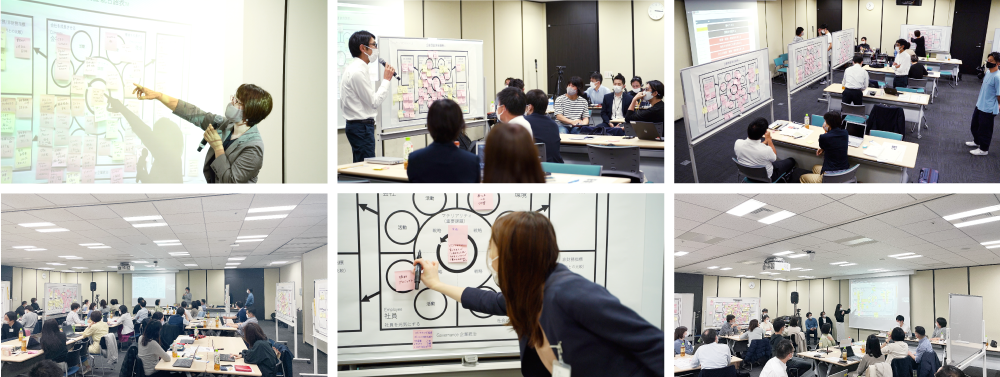
Shima: At the workshop, we received many positive comments from the companies. It was good to be able to discuss areas where action was lacking and specific strategies while filling in the integration statements. Also, each company presented their issues and concerns in front of the others and exchanged opinions, which resulted in a frank discussion. We would like to continue holding these kinds of workshops this year.
Murayama: In the future, the Integrated Statements will be developed as a Dentsu solution service. I hope that more companies will grasp the areas in which they are lacking by filling out the Integrated Chart and take action. Furthermore, I would be happy if Dentsu's creativity could support "symbolic actions" that have a strong impact and send a strong message to employees and the world when companies are considering specific actions.
Shima: Regarding future initiatives, we would first like to complete the GDW by 2030 and actively promote it to Japan and the world. At the same time, I would like to foster a culture in which non-financial information such as Well-being is valued in corporate management.
Fujii: As a longer-term goal, we would like to make Well-being part of the global agenda for 2030 and beyond. I believe that it will be important to obtain a consensus among many countries as well as cooperation from the private sector.
Shima: The SDGs that are being implemented now may be considered actions to reduce “negative legacies.” I believe that Well-being can contribute to this. We would like to spread this concept and increase the number of companies, people, and countries that support it.
